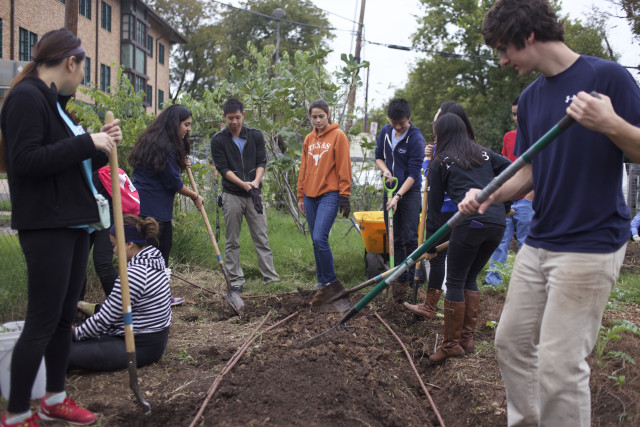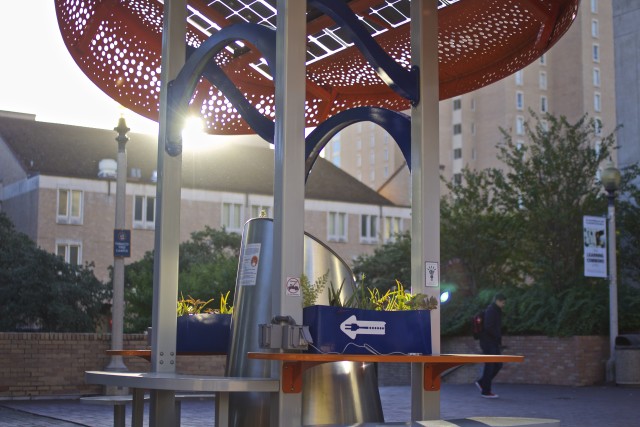With UT’s ‘Green Fee’ Set to Expire, Programs Face Funding Loss
By Lauren Florence
Reporting Texas

Members of the University of Texas Lions Club work recently at UT’s MicroFarm, one of the projects funded by a student “green fee.” Lea Konczal/Reporting Texas
On Austin’s Leona Street, a block east of Interstate-35, a once-empty, 7,500-square-foot corner of land has been transformed into an environmentally friendly garden.
Run by 11 University of Texas at Austin students, the MicroFarm uses organic techniques to grow produce that is sold at a campus farm stand or donated to local homeless shelters. While the MicroFarm’s techniques for growing crops such as Malabar spinach, butternut squash and okra are economically sustainable, its funding might not be.
The garden is among 83 initiatives and 103 research projects that have received money from a $5-a-semester student “green fee” that began in 2011, according to a report from UT’s Office of Sustainability. As of June, just under $2 million in grants had been awarded.
The grants have gone to a wide range of projects, from $6,500 to start a campus beekeeping organization to more than $150,000 to build two solar-powered cell phone charging stations. This year, $7,500 is being spent on a “Water Bottle Waste-Scape”—an art piece created from discarded water bottles—and $60,000 is going to develop campus rainwater harvesting systems.
The fee benefits some students, 115 of whom have held 63 campus jobs “related to sustainability,” according to the UT report. The money is handed out by a board composed mostly of students, and two-thirds of funds have gone to student projects.
But the fee ends in the summer term of 2016 under the terms of a 2009 state law that allowed Texas public colleges to impose the fee for a maximum of five years.
The MicroFarm is fortunate. It has received about $80,000 since the fee started, and organizers expect the money to sustain the project through 2017. Many other projects will run out of money. For example, after next May, green fee-funded graduate student research on topics such as water harvesting and Waller Creek pollution won’t get more money.
Jake Greenfield, 34, assistant director of the farm and a senior studying ecology and evolution, said he hopes the garden will stretch its money to last longer. if the fee isn’t renewed, the project will seek outside funding.

One of two solar cellphone-charging stations on the UT campus funded by the student green fee. Lea Konczal/Reporting Texas
“I think there’s a sense that a lot of sustainability things, from a purely economic standpoint, can seem somewhat frivolous, but they’re cool, and they’re really engaging with the students,” he said.
Karen Blaney, program coordinator at UT’s Office of Sustainability, said she hopes university leaders might reinstate the fee. Blaney said the authors of the original legislation intended that the fee could be renewed, but that’s not explicitly spelled out in the law. An attempt to add a clarification didn’t succeed in the Legislature this year, and legislators don’t meet again until 2017.
“I think the most important aspect of [the fee] is that it’s students proposing projects to other students, and they choose,” Blaney said. “It’s this governance thing that is really hard to replicate in any other way. The actual sustainability projects range all over the map according to what you’re passionate about—from food to energy to classes to research. So the content doesn’t matter so much as the fact that you have this power over this money.”
Melanie Brown, a 20-year old nutrition junior, said that without the green fee, she probably wouldn’t have found money for the BEEVO Beekeeping Society, which teaches students urban beekeeping skills and maintains a colony of several thousand bees at the northern edge of campus.
“I’ve been trying to get a pollinator-garden areas on campus,” said Brown, the society president. She explored finding money through another avenue—the university’s sustainability master plan—but said, “It’s a little too vague on whether or not I can and where I can—it’s so much hoop-jumping.”
While the organization began meeting only this past spring, Brown said she hopes to find funding for one or two more hives.
“I think we’ll make it work, because the students want it and we have a lot of passionate students on campus,” Brown said. “We’re not just going to let stuff die.”